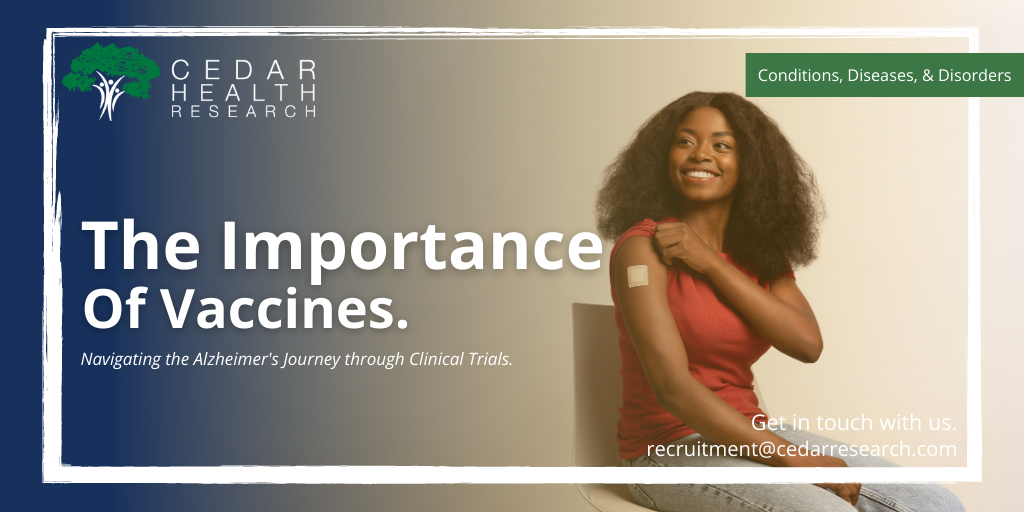Throughout history, infectious diseases have threatened our health, claiming many lives and inflicting suffering on communities worldwide. In the face of such adversities, vaccines have emerged as a beacon of hope, providing support against potentially deadly pathogens. From the most known epidemics such as smallpox to polio, and more recently, the COVID-19 pandemic, vaccines have been used for their ability to further protect individuals and communities. In this blog, we will explore the key role vaccines play in preserving public health, supporting prevention, and how you can stay ahead of disease through Cedar Health Research’s Vaccine Clinical Trials.
Preventing Diseases
Vaccines are one of the most effective tools to prevent infectious diseases. Several vaccines have reduced diseases that once routinely harmed or killed babies, children, and adults. By introducing a weakened or inactive form of a pathogen into the body, vaccines can trigger an immune response without causing illness. The body then generates antibodies that could recognize and destroy the actual pathogen if exposed in the future. This process supports immunity, bolstering individuals’ resistance to infection and with the hope of preventing diseases from spreading further. People all over the world, including in the United States, still become seriously ill or even die from diseases that vaccines could help prevent. According to the CDC, it is important that you stay up to date on recommended vaccines.
Reducing Deadly Diseases
The history of vaccination has some remarkable achievements, with a few diseases being completely eradicated or significantly reduced in their prevalence. Smallpox, once a devastating global disease, became the first disease to be predominately eliminated through vaccinations. Polio is another historical example, with vaccines driving the disease to the brink of eradication in many regions. These successes show the grand impact vaccines can have on public health when embraced on a global scale. We now have vaccines to prevent more than 20 life-threatening diseases, with the aim of helping people of all ages live longer, healthier lives.
Protecting the Vulnerable: Herd Immunity
Staying up to date on vaccinations can safeguard you as an individual and also offers a potential for increased protection for vulnerable members of society who cannot receive vaccines, such as infants, elderly individuals, and those with weakened immune systems. When a sizable portion of the population is immunized against a disease, a concept known as ‘herd immunity’ comes into play. Herd immunity interrupts the transmission chain of a pathogen, making it exceedingly difficult for the disease to spread. Cedar Health Research offers a variety of accessible vaccine trials to help drive herd immunity and protect those around us.
Clinical Trial Misinformation
Despite their reported benefits, vaccines still face opposition driven by misinformation and skepticism. Even clinical trials that assist in bringing these vaccines to market also misconceived by the general population. It is essential to address these concerns with evidence-based information. Rigorous scientific testing and regulatory processes are closely monitored and ensure that vaccines are reported safe and effective before they are approved for use. Public health campaigns and education are vital to counter misinformation, ensuring that people make informed decisions about their own vaccination. Our Cedar Health Research team is dedicated to educating our communities and being a part of each stage of a clinical trial right alongside our patients.
Our Current Vaccine Trials
We can all remember the days leading up to a new school year or a season of sickness that waved over our community… Cedar Health Research is here to be a part of this season with several vaccine clinical trials for all ages and demographics. See our actively enrolling vaccine trials below to determine if you are eligible to be a part of advancing medical healthcare. Compensation for time and travel is available to those who qualify.
- Influenza – available to adults 50 + years of age
- Adult RSV – available to adults 70 + years of age
- EBV (Mono) – available to adolescents aged 12-17
- CMV – available to Women aged 16-60
Please contact our Patient Education team if you or a loved one are interested in learning more about one of our vaccine trials. Or see our website for other trials spanning many therapeutic areas.
recruitment@cedarresearch.com
Clinical Trial Educators @ 945-465-2300.
Resources:
Centers for Disease Control and Prevention
https://www.cdc.gov/vaccines/adults/reasons-to-vaccinate.htmll
The World Health Organization







